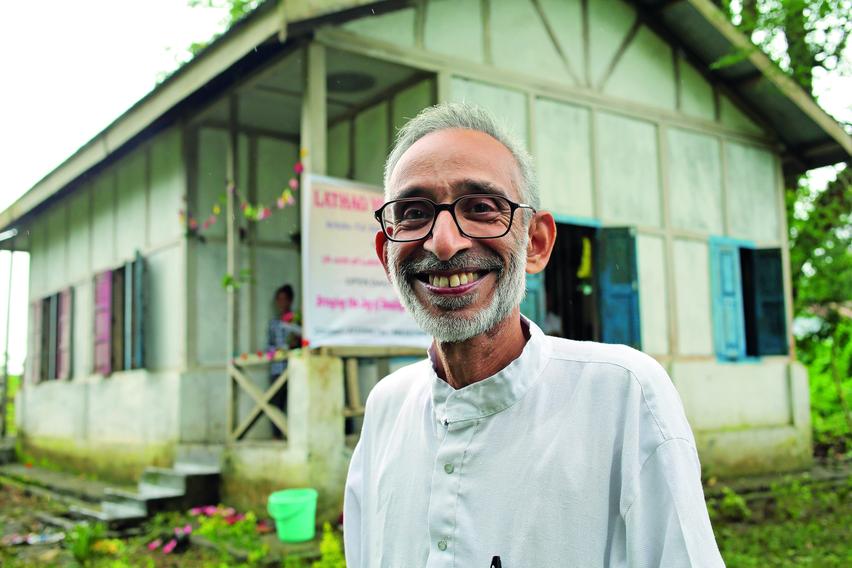
Uncle Moosa in Arunachal
Bamboosa Library finds a home
Civil Society News, New Delhi
WHAT does it take to keep a library going? A passion books for sure. But make no mistake, you can’t do without some real estate even in these digital times.
Take the example of the Bamboosa Library in Tezu, the town which is the headquarters of Lohit District in Arunachal Pradesh. It has been at the core of the Lohit Youth Library Network since 2007, but it is only recently that it has found a permanent address.
Land allotted to an NGO by the Arunachal government has been used to construct a building for the library in Tezu where some 10,000 books are housed. This puts to an end the uncertainties that dogged the Bamboosa Library’s future.
“Now we don’t ever have to move. You must visit us again,” says Satyanarayan Mudayoor, affectionately called Uncle Moosa in Arunachal.
The Bamboosa Library is at heart of the Lohit Youth Library Network which continues as a movement to promote reading and self-expression.
Read Aloud sessions are being regularly held at the Bamboosa Library and, depending on volunteers, books are reaching homes and government schools across the largely rural state.
“Libraries in the network flourish depending on the convenience and involvement of local mentors at a given time,” says Uncle Moosa. “Hence the range of their activities too vary.”
“The Bamboosa Library has been the HQ conducting event regularly and that has been because it has had volunteers and has been supported by many senior volunteers in Tezu town,” explains Uncle Moosa.
The senior volunteers are those who came to the movement as children and moved on in life. But they remain connected to the libraries and Uncle Moosa.
He arrived in Arunachal in the 1970s from Kerala to serve as a teacher as part of a national effort to spread education and integrate the mountainous border territory with the Indian mainstream. He never went back and now at the age of 71 is part of the tribal cultural mosaic.
A short, frail man with a bird-like presence, Uncle Moosa has few needs and lives to dream. He dresses in a mundu and kurta and a cloth jhola is mostly his entire baggage. When he speaks it is in one continuous stream as though twittering.
He is much loved locally and welcomed into homes. Beginning as a teacher, he saw the potential of libraries in not just spreading formal education but also in helping the young along in complicated stages of their lives. As a result, he has seen more than one generation grow up and is inextricably a part of this extended family.
A few years ago, Uncle Moosa and the library movement entered the Civil Society Hall of Fame. Recently, he was a recipient of the Padma Shri. Our journey to Arunachal to discover him was full of wonderful surprises beginning with Uncle Moosa himself. We invariably don’t meet Hall of Fame entrants till we turn up to check them out. Uncle Moosa was never anything we imagined. Nor were the innocent and fresh faces of tribal youngsters at the libraries and schools. He had clearly created a rare chemistry among them.

“If readers cannot come to books, books must go to readers,” says Uncle Moosa. He explains that the Lohit Youth Library Network was launched in 2007 with this as its motto. The idea was to spread the joy of reading, through activities and personal example, and less to run libraries.
After 17 years, the network continues to be powered by activists. No one works for a salary. Nor does Uncle Moosa who is involved full-time but in an honorary capacity. As will happen with such elective arrangements, outcomes can vary depending on involvement. There will be strong spells and weak ones. But this is the serendipitous style that was envisaged for the network.
“All libraries are run by non-salaried youth volunteers as a service with no monthly honorarium to anyone,” reiterates Uncle Moosa.
Libraries and bookshops are falling apart in big cities, but in Arunachal Pradesh this voluntary effort is spiritedly spreading the joy of reading.
As the books find their way across Arunachal, going from one hand to the next, they discover readers. Readers in turn get to experience the printed word and discover for themselves the world at large in many bits and pieces far removed from their remote lives.
It is a slow and unpremeditated process. A trickle in tune with the easy-paced and pastoral existence in the mountains. No instant results are expected. But a book in hand is the first step towards encouraging reading, spreading awareness and triggering transformations.
The libraries are also free-form. They come alive or go dormant, depending on local champions. Don’t expect to find extensive catalogues or a librarian behind a desk. It is all easygoing and relaxed with titles coming and going. The collections of books are varied — biographies, children’s stories, classics, novels. They are all donated by well-wishers in India and abroad. The Arunachal government library directorate has also provided books.
An important role the libraries play is in personal development. They are venues for the young to meet and interact. Read-aloud sessions spur children to do their own reading. Recitations and skits and plays help the young shed their inhibitions about making public appearances. In remote villages, where little else is available, the libraries, through the activities they promote, provide exposure and some excitement. They offer hope in settings where life, though familiar and secure, can also seem humdrum and remote, especially for teenagers.
Comments
Currently there are no Comments. Be first to write a comment!



